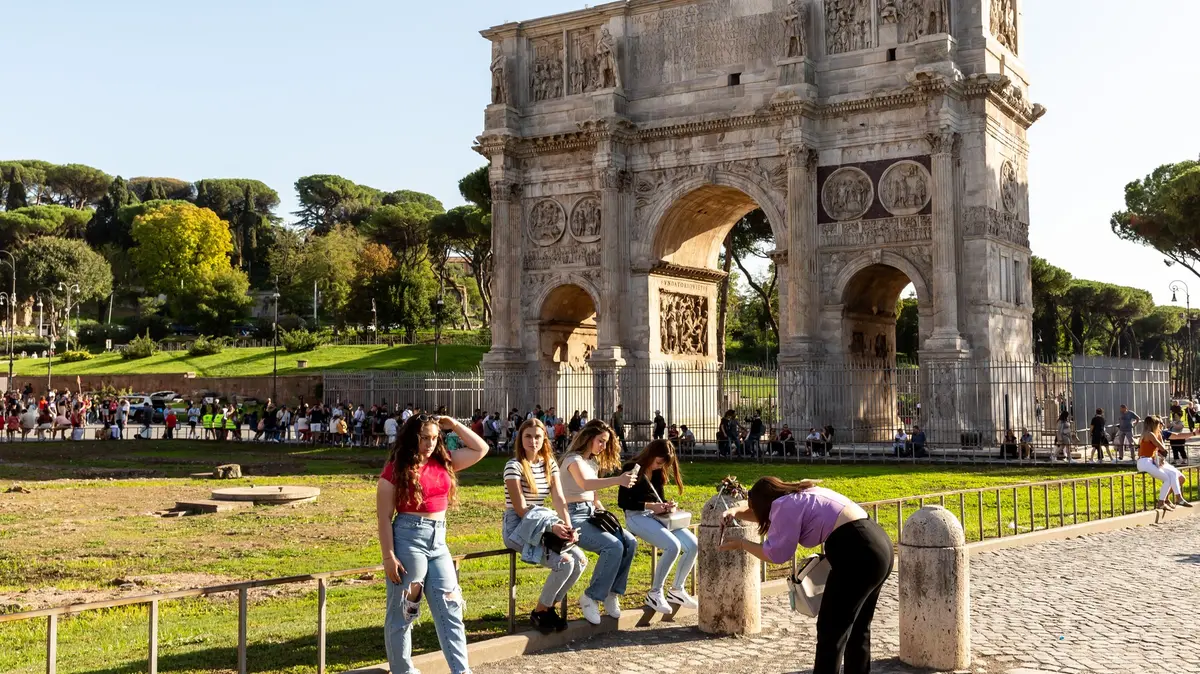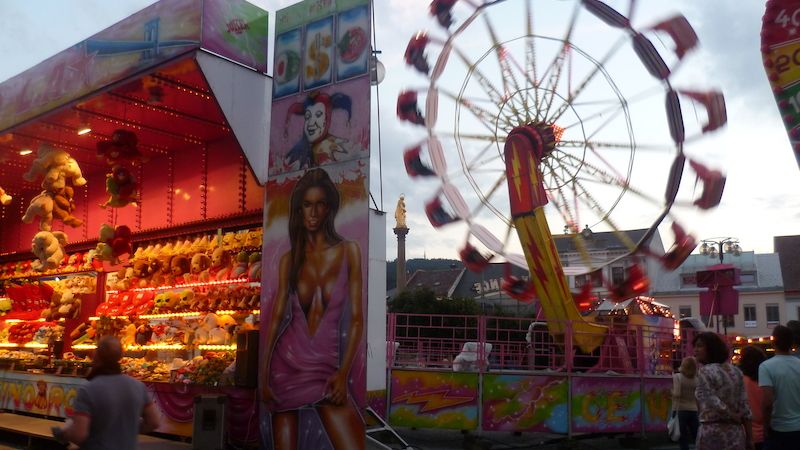In June, two American tourists damaged the Spanish Steps in Rome when they pushed them and then threw their scooters. In May, a visitor from Saudi Arabia drove onto a travertine staircase in a borrowed Maserati and broke two steps.
In Venice, it is no longer uncommon for tourists to swim in the historic canals there. Two Australians chose the Grand Canal, the city’s main thoroughfare, to surf. In January, a half-naked tourist from the Czech Republic posed at a war heroes monument in Venice.
An Australian loitered around Pompeii in August, and this month an American vandalized two statues in the Vatican Museums, allegedly because he couldn’t see the Pope.
A few weeks earlier, two Americans were caught carving their initials on the Arch of Augustus in Rome, a monument more than 2,000 years old. Are there more cases like this than usual or have we just forgotten how bad some people can be when they’re on vacation?
This is nothing new
The number of foreign tourists in Italy in the first half of this year was 172 percent higher than last year, even 57 percent higher than the pre-pandemic period, according to data from Italian tourism organization ENIT.
Prosperous San Marino: A miniature country in the middle of Italy
traveling
Eike Schmidt, director of the Uffizi Gallery in Florence, says it’s nothing new that some tourists don’t know how to behave. “I think we’ve picked up where we left off in 2019,” said Schmidt. While the inside of the gallery is heavily guarded and incidents of unruly visitors are rare, outside is different.
People can relax on historic benches carved from the local blue-gray sandstone. Greasy stains or spills of wine and soda are left on them after tourists have had their snack. Last year, Schmidt called for higher taxes on restaurants that didn’t have seating or toilets for his guests, but nothing happened.
In Venice, the city’s police have handled 43 cases of tourists swimming in the canals this year, said police chief Gianfranco Zarantonello. This is almost double compared to last year and even more than pre-2019. “Venice is sometimes not considered a city. Tourists behave in it as if they were on a beach,” he said. He added that while the visitors looked wild, their antics were nothing new. Several years ago, a Russian tourist stole a water bus.
“People are stealing gondolas. They fell out of it one New Year’s Eve, and by the time we got there, one of them was dying of hypothermia. We saved him,” recalls Zarantonello.
Is the dolce vita to blame?
According to Tom Jenkins, head of the European Tourist Association (ETOA), Italy is unique in that it has a large number of very valuable historical monuments. He describes Venice and Rome as living cities where people coexist with real cultural treasures.
“I think we’re looking at the byproduct of a large number of tourists – and bad behavior from a small number of them,” said Jenkins. He did not rule out also attracting people to Italy who have interests other than just seeing the sights. Maybe they bow to the notion of “dolce vita” and believe that Italy is a place where you can really relax, which is certainly not talking about world heritage, says Jenkins.
PHOTOS: One of the world’s most active volcanoes attracts tourists
traveling
Italian experts point out that there aren’t many stories about crazy visitors from other popular tourist destinations, such as France or Spain. According to him, the behavior of foreigners in Italy is related to what they think of the country.
“Many foreign tourists see Italy through stereotypes rooted in film, especially The Sweet Life and Roman Holiday,” thinks film historian Nicola Bassano. “It is considered a place without rules and laws, where everything is art and therefore there is no art,” he added. “They saw no difference between Romans posing as officers trying to make extra money and the Colosseum. Everything becomes part of a show where there are no rules,” added Bassano.
Foreigners still think there are no rules in Italy, says Maria Pasquale, journalist and author of How to Be Italian. “But they were wrong. Of course there are rules, but as someone who lives here and deals with bureaucratic, economic and institutional instability on a daily basis, I can say: sadly, there are often no consequences for those who don’t follow the rules,” he said. .
ETOA’s Jenkins agrees: “Authorities need to be seen to be doing something to stop this kind of behavior”.
Venice’s mayor, Luigi Brugnaro, has been constantly complaining on Twitter about the limited powers to punish unruly tourists. Since many cases are simply misdemeanors, the city can expel troublemakers for 48 hours. They only face criminal charges if they damage the monument.
The feeling of anonymity is to blame
British psychologist Audrey Tang says tourists also go wild for a sense of anonymity abroad, akin to trolls on the internet. “No one knows us and that gives us a sense of protection,” he explains. Behavior in a group also plays a role, in which a person is more courageous than if he were alone. Alcohol is added to this, inhibitions disappear “and we can do things we never thought of,” warns the psychologist.
Mountain Butorac, a guide for Catholic pilgrims, is concerned that cases like the overturned statue in the Vatican museum earlier this month will have little impact even for distinguished visitors. Since a Hungarian geologist attacked Michelangelo’s Pietà with a hammer in 1972, bulletproof glass has protected the statue in St. Peter’s Basilica.
Butorac fears this could happen elsewhere: “One of the beautiful things is that people can actually come face-to-face with statues in museums – I worry that they’re going to put up barriers there after incidents like this,” he says.
To Calabria for great food, beautiful sea and monuments
traveling

“Unapologetic social media guru. General reader. Incurable pop culture specialist.”







